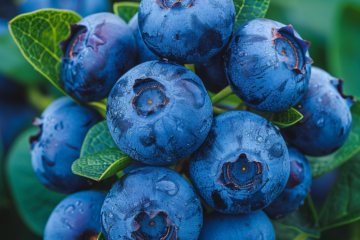Sleep is essential for our overall health and well-being. It plays a crucial role in various bodily functions, including memory consolidation, immune function, and hormone regulation…
However, for many people, achieving a good night’s sleep can be a challenge. From stress and anxiety to poor sleep habits, there are numerous factors that can affect our ability to get quality rest.
Understanding Sleep Patterns and Quality Sleep
Before delving into the benefits of bedtime snacks, it’s important to understand the basics of sleep patterns and what constitutes quality sleep. Our sleep-wake cycle, also known as the circadian rhythm, is regulated by internal and external factors, including light exposure and hormone levels. Quality sleep involves both the duration and depth of sleep, with each stage serving a specific purpose in the body’s recovery and restoration processes.
Importance of Choosing the Right Bedtime Snack
Not all bedtime snacks are created equal when it comes to promoting better sleep. While indulging in a heavy, high-fat meal may leave you feeling sluggish and uncomfortable, choosing the right combination of foods can actually support relaxation and sleep onset. Ideally, your bedtime snack should be light, easily digestible, and contain ingredients that promote the production of sleep-inducing hormones like melatonin.
Melatonin-Rich Foods
Melatonin is a hormone naturally produced by the body that regulates sleep-wake cycles. Consuming foods rich in melatonin can help enhance its effects and promote better sleep quality. Some melatonin-rich options to consider as bedtime snacks include cherries, kiwis, almonds, and walnuts.
Protein-Rich Snacks
Protein is essential for muscle repair and growth, but it can also play a role in promoting sleep. Consuming a protein-rich snack before bed can help stabilize blood sugar levels and prevent nighttime awakenings. Opt for lean protein sources like Greek yogurt, cottage cheese, or a small serving of turkey or chicken.
Carbohydrate Options
While complex carbohydrates are often associated with energy, they can also promote relaxation and sleep when consumed in moderation. Carbohydrates stimulate the release of insulin, which helps amino acids enter the brain and promote the production of sleep-inducing neurotransmitters like serotonin. Consider pairing a small serving of whole-grain crackers or a piece of whole-grain toast with a protein source for a balanced bedtime snack.
The Role of Amino Acids in Promoting Sleep
Amino acids are the building blocks of proteins and play a vital role in various physiological processes, including sleep regulation. Certain amino acids, such as tryptophan, are precursors to neurotransmitters like serotonin and melatonin, which are involved in sleep onset and maintenance. Foods rich in tryptophan, such as turkey, chicken, eggs, and tofu, can help promote relaxation and improve sleep quality when consumed as part of a bedtime snack.
Avoiding Heavy Meals Before Bed
While a light bedtime snack can promote better sleep quality, consuming a heavy or large meal too close to bedtime can have the opposite effect. Heavy meals can lead to discomfort, indigestion, and disrupt sleep patterns, making it harder to fall asleep and stay asleep throughout the night. It’s best to avoid large meals at least two to three hours before bed and opt for lighter, nutrient-dense snacks instead.
The Effect of Caffeine and Alcohol on Sleep Quality
While certain foods can promote better sleep, others can have a negative impact on sleep quality. Caffeine and alcohol, in particular, can interfere with the body’s natural sleep-wake cycle and disrupt the quality of sleep. Caffeine is a stimulant that can increase alertness and make it harder to fall asleep, while alcohol can disrupt sleep patterns and lead to frequent awakenings throughout the night. It’s best to avoid consuming caffeine and alcohol close to bedtime to ensure better sleep quality.
Incorporating Healthy Fats into Bedtime Snacks
Healthy fats, such as those found in nuts, seeds, avocados, and olive oil, can also play a role in promoting better sleep quality. Omega-3 fatty acids, in particular, have been shown to have anti-inflammatory and relaxation-promoting effects, making them an excellent addition to bedtime snacks. Consider adding a tablespoon of almond butter to a slice of whole-grain bread or sprinkling some chia seeds over Greek yogurt for a nutritious and sleep-promoting snack option.

Hydration Before Bed and Its Impact on Sleep
Staying hydrated is important for overall health and well-being, but it’s also essential for promoting better sleep quality. Dehydration can lead to discomfort and disrupt sleep patterns, making it harder to fall asleep and stay asleep throughout the night. While it’s important to stay hydrated throughout the day, it’s best to avoid drinking large amounts of fluids close to bedtime to minimize the need for nighttime trips to the bathroom.
Portion Control and Timing of Bedtime Snacks
When it comes to bedtime snacks, portion control and timing are key. Consuming too much food or eating too close to bedtime can lead to discomfort and disrupt sleep patterns. Aim for a small, nutrient-dense snack about 30 minutes to an hour before bed to promote relaxation and support sleep onset. Experiment with different combinations of foods to find what works best for you and adjust portion sizes accordingly.
Simple Bedtime Snack Ideas
Looking for inspiration for healthy bedtime snacks? Here are some simple ideas to try:
- A small bowl of Greek yogurt topped with sliced bananas and a drizzle of honey.
- A handful of almonds or walnuts paired with a piece of fruit.
- Whole-grain crackers spread with almond butter or hummus.
- A slice of whole-grain toast with avocado or cottage cheese.
- A small serving of turkey or chicken with a side of steamed vegetables.
Tips for Incorporating Bedtime Snacks into Your Routine
To make bedtime snacks a regular part of your evening routine, consider the following tips:
- Plan ahead and stock up on healthy snack options.
- Keep portion sizes small to avoid overeating.
- Experiment with different combinations of foods to find what works best for you.
- Avoid heavy or high-fat foods close to bedtime.
- Listen to your body and adjust your snack choices based on how they make you feel.
Addressing Common Concerns About Eating Before Bed
Despite the potential benefits of bedtime snacks, some people may have concerns about eating before bed. Here are answers to some common questions and concerns:

Will eating before bed cause weight gain?
While consuming excess calories before bed can contribute to weight gain, choosing light, nutrient-dense snacks in moderation is unlikely to have a significant impact on your waistline.
Won’t eating before bed lead to indigestion?
While heavy or spicy foods can cause indigestion and discomfort, choosing lighter, easily digestible snacks can help minimize the risk of digestive issues.
Can bedtime snacks disrupt sleep?
While consuming large, heavy meals too close to bedtime can disrupt sleep patterns, choosing the right combination of foods can actually promote relaxation and support better sleep quality.
What if I’m not hungry before bed?
If you’re not hungry before bed, there’s no need to force yourself to eat. Listen to your body’s hunger cues and consume a bedtime snack only if you feel hungry or if it helps you relax and unwind before sleep.
Are there any foods I should avoid before bed?
While everyone’s tolerance to different foods may vary, it’s generally best to avoid heavy, high-fat, or spicy foods close to bedtime, as they can increase the risk of indigestion and disrupt sleep patterns.



